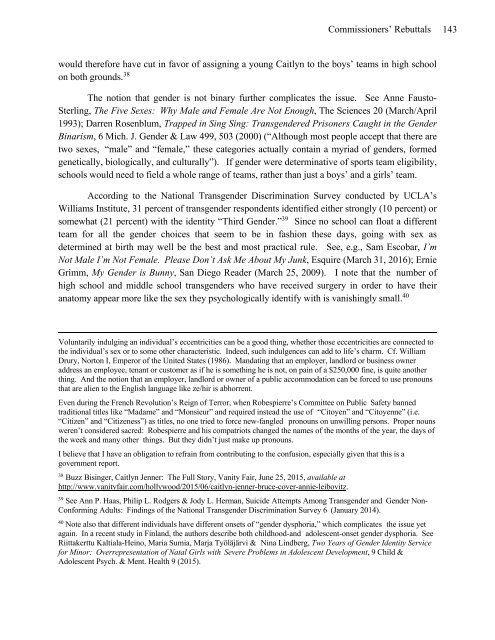PEACEFUL COEXISTENCE
2cgDkdT
2cgDkdT
You also want an ePaper? Increase the reach of your titles
YUMPU automatically turns print PDFs into web optimized ePapers that Google loves.
Commissioners’ Rebuttals<br />
145<br />
because they group transgenders with their biological/anatomical sex rather than with the sex they<br />
psychologically identify with—something that would have seemed ordinary and unobjectionable<br />
a decade or so ago, but which has become anything but uncontroversial. According to the<br />
Human Rights Campaign web site cited by Commissioner Achtenberg, this is the primary form<br />
the anti-transgender bills it complains of take. 42<br />
It is very unlikely any of these bills would have been drafted in the absence of actions like<br />
that of OCR in requiring the use of the girls’ locker room for changing by an anatomically intact<br />
boy who psychologically identifies as a girl or like that of the City of Charlotte’s ordinance. 43<br />
I note that such proposals appear to be quite popular. 44 Is that because the public is<br />
“motivated by animus” against transgenders? Or that the public is complicit in “thinly-veiled<br />
attempts to turn back the clock” as Commissioner Achtenberg alleges? I don’t think so. While<br />
not all of them are well-drafted to accomplish what I believe to be their aim, none strike me as<br />
anything but honest efforts to deal with an issue. In theory, one can imagine separate restrooms<br />
based on sex or separate restrooms based on gender. For reasons that most Americans agree with,<br />
these bills choose sex as the deciding factor.<br />
South Dakota’s H.B. 1008 is actually quite modest. 45 It applies only to public schools.<br />
The rules applicable to private facilities will continue to be set the way they always have been—<br />
creating gender-specific facilities. (In other words, the law is back to where it was before the City of Charlotte<br />
effectively prohibited both sex-specific and gender-specific facilities.)<br />
By contrast, H.B. 2 does require multi-occupancy restrooms and changing facilities in public schools and<br />
government offices to be designated by “biological sex, ” defined as “the physical condition of being male or female,<br />
which is stated on a person’s birth certificate,” rather than gender. Again, I believe there are good and sufficient<br />
reasons for designating private facilities in this manner (and it is certainly what most people understood the custom to<br />
have been for as far back as anyone can remember). The tough case is the transsexual—one whose anatomy has been<br />
altered to better reflect the individual’s preferred status. I note that, unlike Kansas, North Carolina does alter birth<br />
certificates after surgery of that kind has occurred.<br />
42<br />
I note that these bills are being proposed to deal with sexual privacy concerns and not religion and thus they are not<br />
properly part of this report. But since Commission Achtenberg has brought them up, I believe I need to respond.<br />
43<br />
For the OCR action, see supra at n. 36; for the City of Charlotte’s ordinance, see supra at 41<br />
44<br />
An effort to repeal a Houston transgender-rights ordinance that was thought to give transgenders the right to use the<br />
restroom of their choice, rather than the one that corresponds to their actual sex, passed overwhelmingly. Valerie<br />
Richardson, Houston “Bathroom Bill” Rejected by Voters, Washington Times (Nov. 3, 2015), available at<br />
http://www.washingtontimes.com/news/2015/nov/3/houston-bathroom-bill-rejected-voters/?page=all.<br />
45<br />
Some of the other state bills are more far-reaching. In Massachusetts, H.1320 would state in full:<br />
An Act relative to privacy and safety in public accommodations. Be it enacted by the Senate and House of<br />
Representatives in General Court assembled, and by the authority of the same, as follows:<br />
Section 1. Section 7 of chapter 4 of the General Laws, as appearing in the 2012 Official Edition, is<br />
hereby amended by adding the following clause:<br />
Fifty-ninth, The meaning of “gender identity” shall be distinct from that of “sex” and “sexual<br />
orientation.” Access to lawfully, sex segregated facilities, accommodations, resorts, and


